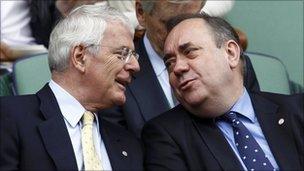Sir John Major dresses in tartan for devolution argument
- Published
- comments

Sir John calls for a system which some call 'devo max'
In a brief pause from the hacking furore I've just been reading a significant speech being delivered by the man who once declared that he was fighting the "Battle of Britain" and warned that there were just "72 hours to save the Union".
In a rare intervention into politics, former Prime Minister Sir John Major calls for the Scottish Parliament to be given powers to control everything except foreign affairs, defence and the economy.
Sir John warned against the dangers of devolution before the 1997 election. Today he calls for what some call "devo max".
If you are wondering why the former Tory leader's dressing in tartan, he explains that in return the English (and, of course, the Conservative Party) would see the end of the hated Barnett formula which gives Scotland more money to spend and a cut in the number of Scottish (usually Labour) MPs.
This may not seem like a live issue today, but it will be in the run-up to the next election. Scotland's re-elected First Minister Alex Salmond has always believed that the Tories were most likely to give him at least some of what he wanted.
This is how Sir John puts it:
"The present quasi-federalist settlement with Scotland is unsustainable. Each year of devolution has moved Scotland further from England. Scottish ambition is fraying English tolerance. This is a tie that will snap - unless the issue is resolved.
"The union between England and Scotland cannot be maintained by constant aggravation in Scotland and appeasement in London. I believe it is time to confront the argument head on.
'Shrinking military power'
"Why not devolve all responsibilities except foreign policy, defence and management of the economy? Why not let Scotland have wider tax-raising powers to pay for their policies and, in return, abolish the present block grant settlement, reduce Scottish representation in the Commons, and cut the legislative burden at Westminster?
"My own view on Scottish independence is very straightforward: it would be folly - bad for Scotland and bad for England - but, if Scots insist on it, England cannot - and should not - deny them."
Sir John's speech to the Ditchley Foundation also calls for appointed MPs - that's right, MPs not Lords - to bring expertise into Parliament, predicts that developments in Europe are likely to drive Britain further away from the EU and warns that the country's political classes are too obsessed by short-term politics and too complacent about the signs that the country is in long-term decline.
"In terms of GDP, the UK is the sixth most wealthy country in the world. But our national balance sheet carries many liabilities. Our physical infrastructure is old. Our health service is creaking. Whilst the best of our education - especially higher education - is world-class, some of it is unforgivably awful," he says.
"We are up to our ears in debt. The Exchequer is empty. The gold is gone. The post-dated cheques are accumulating interest. We are over-taxed. We have an under-class: poorly educated, poorly housed and unmotivated.
"We are no longer an Empire, nor will be ever again. We are a shrinking military power. By choice, and with majority public approval, we are semi-detached members of the EU. And even America - for so long our closest ally who generally sees the world as we do - is turning her face to the East, as self-interest determines she must."